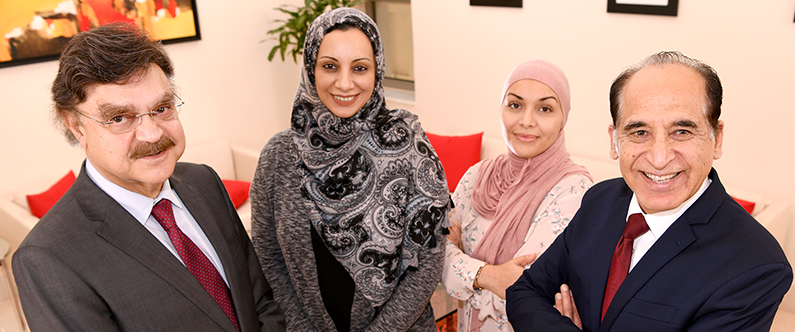WCM-Q research praises Qatar’s commitment to health education
 Dr. Javaid Sheikh, Dr. Sohaila Cheema, Dr. Karima Chaabna and Dr. Ravinder Mamtani.
Dr. Javaid Sheikh, Dr. Sohaila Cheema, Dr. Karima Chaabna and Dr. Ravinder Mamtani.
The vision of Qatar’s leadership to develop and train medical professionals and build national healthcare capacity has been supported by new research conducted by Weill Cornell Medicine – Qatar.
The study, entitled ‘Capacity building in healthcare professions within the Gulf Cooperation Council countries: Paving the way forward’, published in BMC Medical Education, was led by the dean of WCM-Q, Dr. Javaid Sheikh, along with other senior doctors and scientists, against the backdrop of a worldwide shortage of healthcare workers. The situation is of concern in the GCC nations because of a lack of nationally-trained professionals leading to a reliance on expatriate healthcare workers and consequently a high turn-over of employees. Other study investigators included Dr. Sohaila Cheema, Dr. Karima Chaabna and Dr. Ravinder Mamtani, all of WCM-Q, and Dr. Albert Lowenfels from New York Medical College.
The research cites figures that show that in 2014 the GCC had an average of just 2.193 physicians for every 1,000 people, compared to the US which had approximately 2.5 per 1,000, or Norway which had 4.38. A similar shortage is found in nursing and midwifery. There is also a cultural schism between healthcare professionals and their patients due to the fact that people from as many as 100 cultures live in the GCC, although programs like the Institute for Population Health’s Center for Cultural Competence in Health Care at WCM-Q are working to address this and improve healthcare professionals’ cultural awareness.
The study concluded that a locally trained healthcare workforce is vitally important for the GCC nations. In addition, capacity building efforts would help the nations to focus on major healthcare challenges and also aid in further improving the overall quality of healthcare.
Dr. Sheikh said that it was prescient of Qatar’s leadership to recognize this as early as they did, and to establish Qatar Foundation and Weill Cornell Medicine – Qatar.
He said: “The creation of Qatar Foundation and its partnerships with US universities have allowed the country to build capacity in a number of significant areas but few can be as important to the well-being of the population as biomedical research and healthcare. The World Health Organization reported in 2017 that GCC countries should plan their healthcare systems by focusing on building human capacity at all levels, including academia, and this is precisely what Qatar and Weill Cornell have been doing together since the college was inaugurated in the country in 2002.
“The decision by His Highness the Father Emir and Her Highness Sheikha Moza to establish Qatar Foundation, coupled with the continued support and leadership of Her Excellency Sheikha Hind, proved to be insightful and has allowed Qatar to build the foundations for a world-class healthcare system.”
The study also highlighted the success of Qatar’s Nursing and Midwifery Strategy 2015-2018 which was launched by Hamad Medical Corporation under the leadership of the Ministry of Public Health in order to facilitate high-quality, effective, patient-centered care.
A further area which the research cited as being fundamental to the development of national capacity, was continuing medical education.
Dr. Sheikh and his colleagues said continuing medical education and professional development allows healthcare professionals to maintain their skills and stay abreast of developments and new therapies. For continuing medical education programs to be effective, though, country-specific needs assessments should be conducted, and areas of improvement constantly identified.
WCM-Q has been at the forefront of developing innovative, needs-based continuing professional development programs. One of the core purposes of the college’s Institute for Population Health is to strengthen health professionals’ capacity through high-quality education and training programs.
Dr. Ravinder Mamtani, senior associate dean for population health, capacity building and student affairs, leads the institute and also contributed to the research paper.
Dr. Mamtani said that both people and communication skills are crucial to capacity-building and that capacity building programs should not focus on one discipline, but rather should be interprofessional, including doctors, nurses, dentists, paramedics, pharmacists and other healthcare professionals.
The research concluded that continuing medical education programs are vital to capacity building in healthcare, and that strengthening this capacity is addressing major healthcare challenges like non-communicable diseases, but also infectious diseases, mental illness and women’s health.